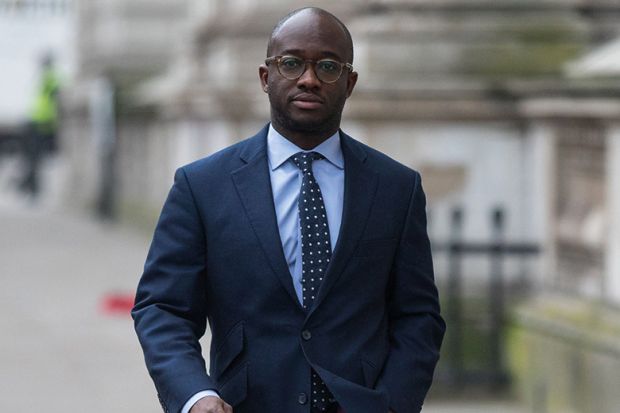As long as he was minister, Sam Gyimah told the audience of a thousand university staff at last week’s Times Higher Education Awards, they would have a champion in government.
These were words that university staff in the UK needed to hear after a year of attacks from all sides. But 24 hours later, Gyimah was gone. That escalated quickly, as they say.
Gyimah spent less than a year in the job and remained an enigma as minister.
His early decision to prioritise students was probably good politics for an ambitious Conservative looking to stabilise the party’s position among younger voters.
But did he ever get to grips with a wide-ranging brief in a way that won the confidence of academia?
It did not help that, while he spent a lot of time on his student-focused “Sam on Campus” tour, and seemed readily available for comment to right-leaning journalists peddling old rope, he was far less available for serious interrogation on the detailed and substantive issues.
A rocky start seemed to be getting smoother, with the strengthening of his policy advisory team apparent, but there was still a tendency for mixed messages, with positivity one minute, and criticism that seemed to be playing to a different gallery the next.
This partly reflects a wider disjointedness in the apparatus of English higher education.
Take, for example, the Office for Students’ recent tub-thumping about “badly managed” universities being allowed to fail. The macho musings were swiftly followed by Gyimah making a distinction in a conference discussion that government may take a different view of an institution that was failing because of bad management and one that had been skewered by policy developments. Confused? You aren’t the only one.
Nevertheless, the view of Nick Hillman, director of the Higher Education Policy Institute, is that Gyimah’s departure may be “deeply regretted” by the sector. This is particularly true, he suggests in a blog, “if rumours that he was fighting hard behind the scenes to deepen understanding in Whitehall of how damaging a cut to university funding would be are true”.
As we report, one of the major concerns for universities will be that his departure comes just before England’s post-18 funding review reports its conclusions, potentially removing resistance to any damaging recommendations. Will the new minister be up to speed in time?
Ironically, the thing that has won Gyimah the greatest credibility among university staff is probably his departure, given that he has left with the suggestion that a second referendum on Brexit could be the best option if Parliament remains in deadlock.
This is exactly what the vast majority of academics, students and, indeed, graduates want to happen – as was discussed at the THE Live event which also took place last week.
Delivering the inaugural THE annual lecture in London, Sir John Curtice, professor of politics at the University of Strathclyde, who is known for his election-night exit polls, gave a detailed analysis of the Brexit vote, and the traits that were common among voters to leave or remain.
This was not an issue of left versus right, he pointed out, but of those with a socially liberal versus a socially conservative perspective.
A large majority of graduates (and even larger majority of those working in higher education) subscribe to the former, and Curtice suggested that it was this fact that prompted universities to take the highly unusual decision to enter the political debate at the time of the Brexit referendum and campaign as institutions to remain in Europe.
That this outcome was in the interests of universities themselves is also clear, and further muddied the waters, contributing to the impression of self-interest.
Curtice warned against a repeat in the campaign for a second referendum, and as we report in our news pages advised instead that individual academics should be encouraged to make interventions from positions of expertise. “Universities’ intervention in politics compromised their staff’s ability to act as a source of policy expertise,” he warned.
It is a sobering assessment that no doubt some will disagree with, but Curtice speaks as both a political analyst and an example of how academic expertise can be translated for public impact in spectacular fashion. Like his exit polls, his advice should not be discounted lightly.
POSTSCRIPT:
Print headline: Damaging departures
Register to continue
Why register?
- Registration is free and only takes a moment
- Once registered, you can read 3 articles a month
- Sign up for our newsletter
Subscribe
Or subscribe for unlimited access to:
- Unlimited access to news, views, insights & reviews
- Digital editions
- Digital access to THE’s university and college rankings analysis
Already registered or a current subscriber? Login






